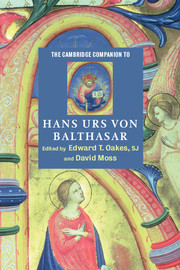Book contents
13 - Balthasar’s biblical hermeneutics
from Part III - Disciplines
Published online by Cambridge University Press: 28 May 2006
Summary
Hans Urs von Balthasar believed that all theology is hermeneutics: theologians should devote their energies to interpreting God's self-revelation in nature, history, and the Bible (TD2, 91). His principal theoretical remarks about scriptural interpretation are found in the first volume of The Glory of the Lord, the second volume of the Theo-Drama, the third volume of the Theo-Logic, and in a handful of essays. Although he sometimes emphasized different aspects of biblical hermeneutics in these discussions, several salient points, summarized briefly here, will be elaborated in this chapter. Balthasar argued that the atrophied aesthetic sensibilities of most modern theologians and biblical scholars have undermined the Church's biblical interpretation in various ways. Appropriating the lessons of premodern theological aesthetics would help to revive a set of ancient and medieval hermeneutical conventions that are not incompatible with certain features of contemporary biblical scholarship. These conventions include viewing the Bible as a self-glossing, christologically focused story, the proper interpretation of which is enabled by the Holy Spirit and nourished by regular liturgical worship. The range of ecclesially fruitful interpretation is constrained both by the intentions of its human and divine authors and by the rule of faith.
- Type
- Chapter
- Information
- The Cambridge Companion to Hans Urs von Balthasar , pp. 175 - 186Publisher: Cambridge University PressPrint publication year: 2004



